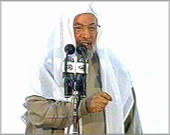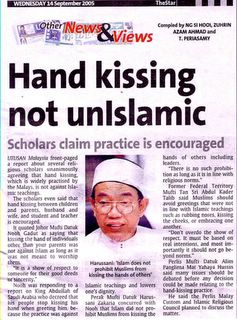I am intrigue by the writings of Yusuf al-Qaradawi in his book 'The Lawful and The Prohibited in Islam (Al-Hala wal Haram fil Islam) which was translated by Kamal El-Helbawy, M.Moinuddin Siddiqui and Syed Shukry.
Below are an abstract of the knowledge of the rule of haram and halah which might help many who is confused by the statement of DPM Najib pertaining to hugging and kissing at the cheeks.
The question of what ought to be halal and haram was a matter of great concern as the people had gone far astray and were utterly confused, permitting many impure and harmful things and prohibiting many things that were good and pure.
The Arabs of the pre-Islamic era provide a noteworthy example of utter confusion regarding the criteria for making lawful or prohibiting things and actions. They permitted the drinking of alcohol, the taking of usury at exorbitant rates, the torturing and secluding of women, and many similar practices. Those who had diabolical minds made alluring to many of them the killing of their own children, until, suppressing their natural paternal feelings, they obeyed them.
It is strange that these same people who permitted the killing of their children by cutting their throats or burying them alive had prohibited to themselves the eating of certain argicultural produce and the flesh of cattle. Stranger still is that they considered such prohibitions as part of their religion, attributing them to Allah's command.
The Quran exposed the error of those who made halal what should had been haram:
"Lost are those who kill their children in folly, without knowledge and prohibited what Allah has provided them, forging (lies) against Allah. They have indeed gone astray and are without guidance" (6:140).
When Islam came, one of it's initial accomplishment is to establish certain legal principles and measures for rectifying this matter and determining criteria on which the questions of what is halal and haram were to be based. Thus this vital aspect was determined according to the basis of the principles of justice.
The first asl, (or principle), established by Islam is that the things which Allah has created and the benefits derived from them and essentially for men's use, and hence are permissible. Nothing is haram except what is prohibited by the sound and explicit nas from the Law-Giver, Allah Subhanahu wa Ta'ala. Nas denotes either a verse of the Quran or a clear, authentic, and explicit sunnah (practice or saying) of Prophet Muhammad. If the nas is not sound, as for example in the case of a weak hadith, or it is not explicit in stating the prohibition, then the original principle of permissibility applies.
This Islamic principles is based on the fact that since, Allah Himself had created all the things in the world, given man control over them, count them as His favours upon him, and subsequently inform him that their use is prohibited; how could this be when He created all these for men's use and benefit? Allah had only prohibited a few things for specific reasons and the sphere of prohibition is small.
According to Salman al-Farsi, when the Prophet was asked about animal fat, cheese and fur, he replied:
"What Allah has made lawful in his Book is halal, and what He has forbidden is haram, and that concerning which He is silent is allowed as His favour." (19:64)
Accordint to Yusuf al-Qaradawi,the same principle is not limited to things and objects but also include all human actions and behaviors not related to acts of worship, which may be termed as living habits, or day-to-day affairs. It does include culture and traditions, including huggings and holding hands. The principle is that what is not explicitly prohibited as haram in the Quran and restricted, they should be allowed without restriction.
The exception will be regarding the acts of worship which are purely religious acts and for this, only what Allah Himself reveals. The Hadith enunciates that "Any innovation in our matter of worship which is not a part of it must be rejected." Anyone who invented or originates a form of worship on his own has gone astray and must be repudiated, for only Allah Himself has the right to originate acts of worship through which human beings may seek nearness to Him.
In the words of Ibn Taymiyyah, "People's saying and actions are of two kinds: acts of worship and customary practices. ...from the principles of the Shari'ah, we know that acts of worship are those acts which have been prescribed by Allah or approved by Him; nothing is to be affirmed except through the Shari'ah." (Al-Qawa'id al-Nuraniyah al-Fiqhiyah; page 112-113).
If the Syari'ah says something concerning these mundane matters, it is in order to teach good behavior. Accordingly, anything that leads to strife will be prohibited. Islamic principles of permissibility requires that everything must be done with due consideration for the kinds of activities involved, their magnitude and properties.
This principle is also supported in a sound hadith by the prophet's Companion, Jabir bin Abdullah. He said: "We used to practice 'azl (coitus interruptus, or withdrawal before ejaculation during intercourse) during the period when the Quran was being revealed. If the practice were to have been prohibited, the Quran would have prohibited it." Jabir therefore concluded that if the divine revelation was silent about something, it was permissible and the people are free to practice it.
The seond principle is that Islam has restricted the authority to legislate the haram and the halal, taking it out of the hands of human beings, regardless of their religious or worldly position, and reserving it for the Lord Himself. Neither rabbis nor priests, kings or sultans have the right to prohibit something permanently to Allah's servants (including Najib and UMNO Youth); if someone do this, he has certainly exceeded his limits, usurping the sovereignty which belongs to Allah Subhanahu wa Ta'ala alone.
While Islam reprimands all those who, on their own authority, declare what is lawful and what is prohibited, it is more strict with respect to those who voice prohibitions as this tendency is prevalent among some of those who go to the extremes in matters of religion. The prophet fought against this pseudo-pietism and zealotry by every means, warning those who indulged in it with the words, "The zealots will perish," repeated three times.
The Prophet characterized his message by saying:
"I have been sent with what is straight and easy".
The straightness of the message consists of belief in tawheed (the unity of Allah) and its ease in practice and legislation, in contrast to shirk and to the prohibition of good things of this life.
The prophet has mentioned all this in a hadith qudsi (the meaning is from Allah) reporting the saying of Allah Ta'ala:
"They prohibited to people what I had made lawful for I created people upright (hunafah). Then the evil ones came to them and led them astray from their religion and commanded them to associate with Me that for which I had not sent down any authority."
Islam lays great stress on nobility of feelings, loftiness of aims, and purity of intentions. "Actions will be judged by intentions and everyone will be recompensed according to what he intended," the prophet enunciated.
The prophet also has this to say:
"Anyone who desires what is permissible from the world, keeping himself from sins, working for the sake of his family, and taking care of his neighbour, will meet his Lord with a face shining like the full moon."
In this manner, whenever any permissible action of the believer is accompanied by a good intention, his action becomes an act of worship. In the case of haram, it remains haram no matter how good the intention and how honorable the purpose, or how lofty the aim may be. Islam can never consent to employing a haram means to achieve a praiseworthy end. Indeed, it insists that not only the aim be honorable but also that the means chosen to attain it be pure.
"The end justifies the means" is not the maxim of the Shari'ah nor is "Secure your right even though wrong-doing". The Shari'ah demands that the right should be secured through just and fair means only.
If anyone amasses wealth through haram means and then gives charity from it, there is no regard for him and the burden of sin remains (reported by Ibn Khazamah, Ibn Hibban, and al-Hakim on the authority of Abu Hurairah).
As an example, the prophet firmly proclaim that:
"By Allah, even if Fatimah, my daughter was to steal, I would have her hand cut off." (reported by al-Bukhari).
In conclusion here, it must be remembered that Allah does not discriminate between one people and another. The tendencies to use a double standard, one for one's 'brother' and another for a 'foreigner' or outsider, is a characteristic of primitive ethics. It can never be ascribed to a divinely revealed religion, for high morality is distinguishable by its universality and comprehensiveness and by its lack of a double standard.
I am not sure whether classifying a community as Bumiputra and the others as non-Bumi falls under this categorization; and the various proposed Agendas propagated by the Islamic anointed scholars are within the principles of Islam. What would the prophet had said if he is here today?




